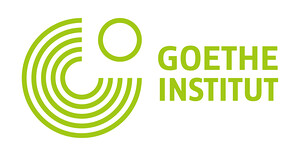March 6, 2018
Em’kal Eyongakpa receives EUR 20,000 Henrike Grohs Art Award 2018
Selected by jury members Koyo Kouoh, Laurence Bonvin, Raphael Chikukwa and Simon Njami
Em’kal Eyongakpa (born 1981 in Mamfe, Cameroon) is the first recipient of the Henrike Grohs Art Award, conceived by the Goethe-Institut and the Grohs family. He will be awarded with a EUR 20,000 cash prize on March 13, 2018 in Abidjan.
“The jury unanimously awards the inaugural Henrike Grohs Art Award to Em’kal Eyongakpa for his poetic, subtle and subjective approach. His work expresses universal concerns of humanity. The multidisciplinary stance of his practice that includes knowledge derived from science, ethnobotany, magical realism, experimentation and utopia, aptly responds to the core values of the Henrike Grohs Art Award”, said the jury members Koyo Kouoh (Artistic Director, RAW Material Company, Dakar), Laurence Bonvin (artist and representative of the Grohs family, Berlin), Raphael Chikukwa (Chief Curator, National Gallery of Zimbabwe, Harare) and Simon Njami (Curator, Paris).
Em’kal Eyongakpa is an intermedia artist who approaches the experienced, the unknown, as well as collective histories through a ritual use of repetition and transformation. His recent ideas increasingly draw from indigenous knowledge systems and aesthetics, ethnobotany, applied mycology as well as technology in his explorations of the personal and the universal. Eyongakpa is also known for self-organised community research projects and autonomous art hubs like KHaL!SHRINE in Yaoundé (2007-2012) and the recently launched sound art and music platform ɛfúkúyú. He holds degrees in Plant biology and Ecology from the University of Yaoundé and was a resident at the Rijksakademie in Amsterdam. Eyongakpa’s work has recently been exhibited at the Jakarta Biennale (2017), the 13th Sharjah Biennial (2017), La Biennale de Montreal (2016), the 32nd Bienal de São Paulo (2016), the 9th and 10th Bamako Encounters (2011, 2015), the 10th Biennale de l’art africain contemporain, Dak’art (2012) and at several international art spaces and museums around the world.
Klaus-Dieter Lehmann, President of the Goethe-Institut: “We have not only lost a highly esteemed and beloved colleague in Henrike Grohs but also a person who carried hope into the world with her beliefs and actions. Therefore, it is of particular importance to link the memory of Henrike Grohs to a viewpoint that reflects her work and desires. This has come to fruition in the prize, as it promotes the cause of Henrike Grohs: To support African creative artists and make a contribution towards international dialogue. I would like to congratulate the first prize winner Em’kal Eyongakpa with whom, after an intensive selection process, the judges have made an excellent choice.”
The Henrike Grohs Art Award is a biennial prize dedicated to artists who are living and working in Africa and practicing in the field of visual arts. It recognises the lifetime achievements of the former Head of the Goethe-Institut in Abidjan, Henrike Grohs, who was killed on 13 March 2016 in a terrorist attack in Grand-Bassam, Côte d’Ivoire.
Press
For hi-res photoes, visit here.
For video, visit here.
More information about Em’kal Eyongakpa here.
About the Henrike Grohs Art Award
“The Henrike Grohs Art Award is a biennial award dedicated to artists living and working in Africa. Yet the message sent goes far beyond the continent. It is a universal address, a call for reflection and action,” said the jury members Koyo Kouoh (Artistic Director, RAW Material Company, Dakar), Laurence Bonvin (artist and representative of the Grohs family, Berlin), Raphael Chikukwa (Chief Curator, National Gallery of Zimbabwe, Harare) and Simon Njami (Curator, Paris).
The prize recognises the lifetime achievements of the former Head of the Goethe-Institut in Abidjan, Henrike Grohs, who was killed on March 13, 2016 in a terrorist attack in Grand-Bassam, Côte d’Ivoire. The award intends to continue her special commitment to support artists in Africa and make a contribution towards international dialogue.
The award will be awarded biennially to an artist or an arts collective practicing in the field of visual arts. Artistic quality is the most important criteria for the award. Collaborative partnership, imparting knowledge to other artists and social engagement are decisive elements for recognition.
About Henrike Grohs
Henrike Grohs died on March 13, 2016 in a terrorist attack in Côte d’Ivoire along with 17 other people. She studied ethnology and was Head of the Goethe-Institut in Abidjan from 2013 to her death. She co-founded the project “Next - Intercultural Projects” at the Haus der Kulturen der Welt in Berlin. Between 2002 and 2009, she worked as Project Manager in the Berlin Philharmonic Orchestra’s Education programme. In 2009, she was appointed Advisor on Culture and Development at the Goethe-Institut in South Africa. Henrike Grohs was 51 at the time of her passing.
About the Goethe-Institut
The Goethe-Institut is the Federal Republic of Germany’s cultural institute, active worldwide. Its mandate is to promote the study of German abroad and to encourage international cultural exchange. Today it is represented in 98 countries and has some 3,300 employees. It contributes widely to the promotion of artists, ideas and works. Supporting the local cultural scenes and strengthening pan-African dialogue through the arts are part of its mission on the African continent, where it operates 19 institutes in Abidjan, Accra, Addis Ababa, Alexandria, Cairo, Casablanca, Dakar, Dar es Salaam, Johannesburg, Khartoum, Kigali, Lagos, Lomé, Luanda, Nairobi, Rabat, Tunis, Windhoek and Yaoundé, as well as 3 liaison offices in Algiers, Kinshasa and Ouagadougou.
Contact
Benjamin Keuffel
Public Relations Officer / Presse- und Öffentlichkeitsarbeit
Goethe-Institut South Africa
119 Jan Smuts Avenue, Parkwood 2193, Johannesburg
Benjamin.Keuffel [at] goethe.de
T +27 (0)11 442 3232
F +27 (0)11 442 3738
M +27 (0)82 769 3254


